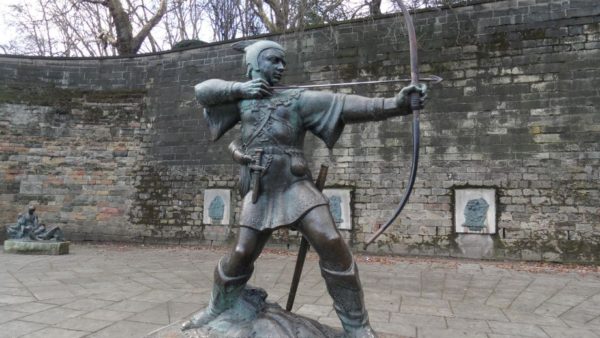~ by Tom Holste
You may not have noticed this, but people disagree on a lot of things. It seems like they disagree more than ever, although maybe we just read about it now more than ever.
But there are some things that most people agree on. And it seems like very nearly everyone likes Robin Hood. But have you ever wondered why?
While large portions of the legend are probably untrue, this is not a story set in Narnia or in a galaxy far, far away. It’s set on Earth in our past, and it’s a story that appears to have some bit of historical truth, however small. Tell a legend about any other historical figure and you’ll probably be met with some derision. (For instance, does anyone still believe that George Washington chopped down a cherry tree?) Yet Robin Hood seems immune to criticism. How come?
I would like to put forth the theory that Robin Hood is the political version of an inkblot test. Everybody sees what they want to see when they read the story. Indeed, perhaps the flexibility of the story as a political metaphor is part of the reason that the legend has endured so long.
In the interest of full disclosure, I have yet to take a scientific poll of the population to determine if this theory holds any weight. It is still, at the moment, just a theory. With the direction that discourse has gone in our country, I confess that I’m nervous to ask. Nonetheless, I think the theory is worth considering.
While I have my own strongly held political beliefs, my goal is not to convince you of them. I have yet to meet anyone who’s changed their political beliefs because of something they read on the Internet. My goal is simply to show you how the story works differently for different readers. (Perhaps this might grant some small measure of understanding of one’s political opponents, if nothing else.) And while there are more than two points of view when it comes to politics, for the purposes of this discussion, I’m going to focus on the two broadest strokes of the political spectrum. (Also, even though Robin Hood is British, I’m going to focus on the American political system because I know it better than other political systems.)
To prove my theory about Robin Hood, let me ask you one simple question. Take a minute to answer the question in your own mind before going on to the next paragraph. The question is this: Why is Prince John a villain? What exactly is it about him that makes him such a bad guy?
For about half of the people reading this, I think they would answer something along these lines: Prince John is bad because he’s so rich and he doesn’t share with anyone. Indeed, the only reason that he is so rich is because he doesn’t share. The common folk starve in the street while Prince John takes away more money than he knows what to do with. As such, Robin Hood is a hero, because Robin Hood takes from the rich and redistributes to the poor. And any politician who redistributes the wealth would be a hero in the spirit of Robin Hood.
But for the other half of the people reading this, I’d wager that their answer would be: Prince John is bad because he taxes people more than they can stand. They also think that Prince John has too much money, but they feel that his method of getting the money–using the government to force hardworking people to give their money up–is what makes him so bad. As such, Robin Hood is a hero, because he upends political corruption and gives the wealth back to the people who earned it.
Thus, if ever there were such a time in our country where a non-politician (dare I say, a businessman) would get into the highest office in the land, half of the people would be enraged, because Prince John—the rich man who doesn’t share—would be in power, and he couldn’t be counted on to redistribute the wealth through taxes. Meanwhile, the other half of the population would be ecstatic, because Robin Hood—the non-politician who subverts the system and who cuts taxes on the wage-earners—would have triumphed. And both sides would be angry at each other for not seeing what a disaster/blessing this was.
Not that any of that would ever happen, of course. I’m only speaking hypothetically.


Very interesting. I think I can agree that I’ve never met a person that dislikes Robin Hood. I’m sure if he lived, back in his time MANY DISLIKED him ;D
As for why is Prince John a villain? I’d say it’s because he didn’t CARE about others. He didn’t love his people. Where as Robin Hood loved. While I think the other two answers you provided hold a lot of truth, they can also quickly lead to socialism being the answer to all our problems. And I’m strongly of the opinion capitalism is the only morally fair way for any good person.
Robin Hood loved God, honored women, and worked hard to prove that he loved God and others more than himself. That’s why I love the story.
Very interesting post!